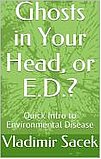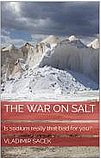■ site map
Health blog 2010-13 2009 2008 2007
On Amazon:
Minimizing breast cancer risk
No more, no less. Breast cancer prevention got to that final point, and beyond. Now you have not one, but two good choices that will safeguard you from ever getting the dreaded disease. Fear breast cancer no more; the rest is history...»MORE
▼ MAY
Hypertension risk:
time to move beyond salt?
The
purpose of the entire recent move to reduce salt intake at the level of
population is hopeful - but unsupported by the facts - expectation of
significantly reduced rate of hypertension, and related adverse health
effects. Is there something in the body of evidence suggesting better
options?...»MORE
Salt
hypothesis and real world
Is our present salt consumption
unhealthful excess? The answer to that question is. like an open
book, lying in front of our eyes. Wide range of salt intake levels
in different countries and regions makes it possible to identify any
significant effect of it on blood pressure and cardiovascular
health, and either prove or disprove salt hypothesis...»MORE
Is sodium bad for
you?
Sodium is bio-electrolyte
essential not only for maintaining optimum health, but for the very
survival. No one disputes that fact. Without it, the subtle flow of
electrical currents supporting life - called
bio-electricity
- would be irreparably interrupted...»MORE
▼ APRIL
Salt studies: the
latest score
Why
is it that after thousands of studies on the subject of salt and
hypertension we don't seem to be anywhere close to consensus on whether
the present salt consumption makes people sick, or not?...»MORE
From Dahl to
INTERSALT
Dahl's
study from 1960 was groundbreaking in that it turned to human
populations to look for the evidence of salt-hypertension link. Dahl's
data was scarce, and of uncertain quality, but the dramatic correlation
between salt and hypertension it showed made big impact on people's
minds. It convinced many - beginning with medical professional - that
current salt consumption is, indeed, major health hazard...»MORE
Salt,
hypertension, pride and careers
What is the factual basis, and the
sequence of events, that made the view that dietary salt intake
raises blood pressure, and so the risk of hypertension and
cardiovascular disease - so called salt hypothesis
- become so deeply rooted in the field of academic medicine that it
became the determinant of governmental health policies...»MORE
▼ MARCH
Hypertension and salt
war
It is silent, but deadly: often
without warning signs, high blood pressure (hypertension)
kills well over 50,000 Americans each year. Moreover, it is among
causative factors in another 300,000 deaths, or so. In short, it is
an enemy with long and terrifying record. Two major governmental
health organizations - Centers for Disease Control (CDC) and
Institute of Medicine (IOM) - decided that it warrants declaring war
on salt, which is for a long time linked to high blood pressure...»MORE
Diabetes vs. drugs, 3:0
If
there were any doubts about the final score of the government's
decade long "landmark study" aspiring to defeat diabetes by throwing
best of drugs - and lots of them - at it, there's none left. Last
month, the remaining two pieces fell in, and the quick summary is:
can't do it...»MORE
Do bone drugs work?
This month, many
causal readers could caught headlines reporting of a recent study
"adding more evidence that bone drugs work". Articles do not
elaborate on what the old evidence is, but they are quick to add
that the new study not only confirms that bone drugs work, but that
it is also "reassuring" of their safety...»MORE
▼ FEBRUARY
The MMR vaccine war: Wakefield vs ?
The rant against Dr. Andrew
Wakefield, started in 2004 by Brian Deer's media feeds, escalated to
a full-blown campaign, not only very unusual in the circles of
high-level medical professionals, but seemingly vastly overgrowing
factual significance of his 1998 study. Whether the MMR vaccine -
and even vaccines in general - do cause serious adverse health
effects, or not, seems to have become solely dependant on whether or
not Wakefield was honest in making and presenting this small
study...»MORE
Wakefield proceedings: an
exception?
Formal proceedings against a medical
study author, such as the fiery controversy that has spun around Dr.
Andrew Wakefield 1998 autism study, are extremely rare. Is the
general absence of professional and ethical misconduct proceedings
against those involved in authoring medical studies and presenting
their data a proof that the vast majority of them are up to highest
professional and ethical standards?... »MORE
Who's afraid of a littl' 1998 study?
Wakefield's autism study, implying
causative link between "environmental triggers", including
vaccination, and "developmental regression", mainly autism, has been
fully retracted by Lancet at the beginning of this month, after
partial retraction (conclusion section) in 2004. The first question
that comes to mind is: "Why did it take so long"? The second: "What
was the reason?"... »MORE
▼ JANUARY
Antibiotic children
That sounds odd, doesn't it:
antibiotic children? Even more so if you think of the inherent
meaning of "antibiotic", which is pretty much the same as anti-life. How
could possibly children be anti-life? Of course, they're not; but, these
days, it literally becomes a part of their lives. Being generation
born to antibiotics, they are bound to have some of their main attribute
rubbed off onto them, one way or another... »MORE
Physical activity benefits late-life
health
Most anyone knows that physical
activity benefits health. This view is supported by both, medical
research and statistical data. Besides being in better overall
shape, physically active individuals are much less likely to succumb
to acute and chronic diseases, or to day prematurely... »MORE
Healthier
life for New Year's
resolution
What is a year of life
worth? Or years of a healthier life, not bothered by poor health and
fear of dying? Their value seems to be low for those relatively
young and healthy, skyrocketing the closer we get to life's end, or
the more we're crippled with a disease. So we keep falling in the
same trap over and over again: we don't appreciate what we have
while we have plenty, and when it's lost, we realize what it really
meant to us, but it is often too late... »MORE
YOUR BODY ┆ HEALTH RECIPE ┆ NUTRITION ┆ TOXINS ┆ SYMPTOMS



